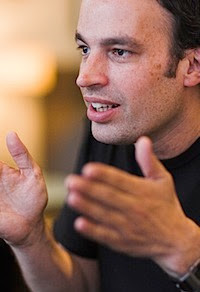Directing Fate

I wanted to put together a few words about the Workshops I have attended run by Rob Sarkies. Each of the three workshops covered a different but pertinent facet of the Directors Role. I was enlightened, enlivened and enabled by these experiences.
Rob has made one of the best films that the New Zealand Industry has produced. Based around the tragic events David Gray brought to Aramoana, a little township down the end of the harbour from Dunedin, Out of the Blue serves as a reminder of this moment of time without ever giving in to the temptation to exploit either the protagonist or his victims- treating each with respect and leaving the audience with much to discuss afterwards and in days to come. I am still drawn to the awful image of the Armed Offenders squad standing around having a cigarette while Gray’s body still trembles and shudders it’s last desperate moments of life. Rob’s Short Films and debut feature Scarfies also provide the fuel to his well thought out and in-depth analysis of his own methodologies that he is so willing to share with participants.
The first of the workshops cover the Five Senses of Film Making and in this workshop participants were invited to examine their own aesthetic of origination through the lens of Rob’s own method. What is presented seems so much like common sense and yet is not, in my experience, something spoken about sufficiently except after the process by academics. In fact this workshop tied in very nicely with the process of my own research, which at that time was around Phenomenology and trying to find my creative Dance. By inviting us to think about our project in this way Rob lead us through the beginnings of a director’s interpretation and influence over a project.
In the second workshop entitled Process, Process, Process Rob made simple the steps he takes as he works from PRE-pre-production into preproduction to production and finally into post. While I say simple, I began to realise that the frame this drafting afforded the director quickly frees up the creative process in much the same way in which I interpret Goethe’s words- and forgive if I have this wrong –‘the mark of a true craftsman is in what he achieves from within the rules’. Clearly Rob’s intention is to seek the freedom of the parameters and the frame rather than the closure of the open-ended situation that places no expectation upon the artist. Further to that is the opportunity for the artist to express himself through the lens of the craft.
In his most recent workshop and the final of three Rob invited us to see the filmmaking process –in particular that of the drama film- through the eyes of the Actor. In doing this he underlines that the fears of those in front of the camera can often mirror those of the director in working with them. He encouraged us to see this crucial opportunity to be one of seeking and using the trust built between director and actor as a way of centring the process of production, a method that makes the set a safe place for both cast and crew by clearly defining the reasons for how he runs a production both on and off the set. He is able to explain clearly as well the opportunity of having a rehearsal period and at the same time the way in which his preparation as a director can mean that even the shortest of moments with an actor can be of benefit to a performance. He also gave a clear observation of his intention to bring truth to the camera and how this can only be achieved through a process of the director bringing together the elements of cast, crew and story.
In conclusion I found every moment of these workshops to be involving- and exhausting. Of course we ended up with pressure on time but even here Rob demonstrated generosity. I would have liked more time to try out some of the skills he had shared with us but it was not possible. I came away sated but at the same time hungry for more. It was a privilege to share time with Rob and as I look at how this turned out I realise that in all of the investment I have put into myself this rates as one of the best ones.
See also The artist who is not also a craftsman is no good; but, alas, most of our artists are nothing else ~ Johann Wolfgang von Goethe

Comments